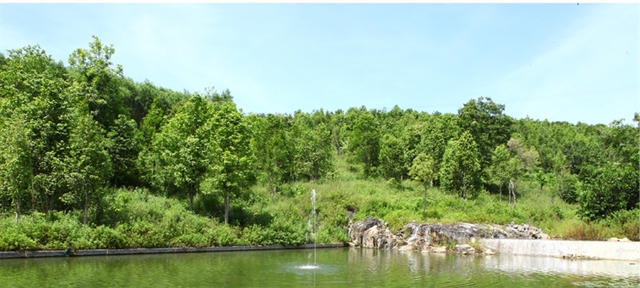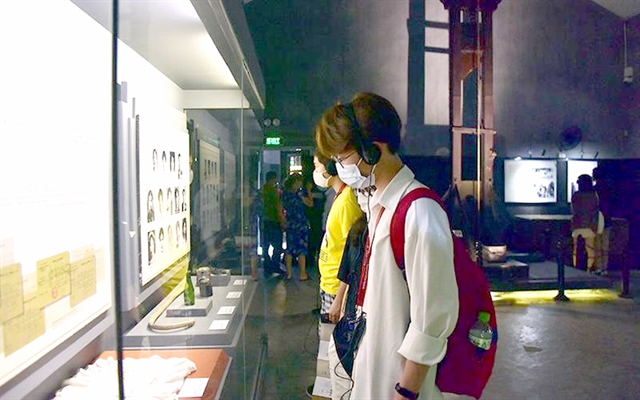 Sunday/Weekend
Sunday/Weekend

 |
| PAST AND FUTURE: Visitors use automatic narration walkie-talkies when visiting Hỏa Lò Prison in Hà Nội. Photo bvhttdl.gov.vn |
As the Fourth Industrial Revolution overwhelms the world, digital transformation (DT) has become an important way to realise the will and aspiration of national socioeconomic development, particularly in the cultural sphere.
For the culture, sports and tourism sectors, such transformation is not only indispensable and urgent, but a requirement for sustainable development.
The Ministry of Culture, Sports and Tourism (MoCST) is embarking on synchronous digital transformation from policy to action, considering it as a strategic breakthrough solution to build Việt Nam into a powerful and prosperous country.
MoCST Minister Nguyễn Văn Hùng has given many instructions for the ministry's digital transformation, including the recent signing of a digital master plan to 2025 and beyond.
-transformed.jpeg) |
| GOING DIGITAL: A tourist uses an app to find information about Văn Miếu-Quốc Tử Giám (Temple of Literature). VNA/VNS Photo Tuấn Đức |
The plan targets comprehensively renewing the management and administration activities of the ministry, improving ministerial services for people and businesses, developing a digital culture to contribute to forming a "digital citizen generation".
Tasks in building a digital cultural environment have been assigned and are working well. The ministry's many DT programmes have been approved by the Government such as the Vietnamese cultural heritage digitalisation for 2021-2030, DT for the library sector over the next decade, and a project on building an online film distribution centre.
Due to the pandemic, cultural and artistic activities shifted towards the digital environment, with various art shows widely broadcast through online platforms and social networks.
"Digital transformation is identified as a strategic breakthrough solution to build a strong and prosperous Việt Nam so that in 2045, the country will celebrate its 100th founding anniversary as a high-income developed nation," MoCST Deputy Minister Hoàng Đạo Cương said.
"This has been crystallised from the intellect and determination of the whole Party and people, as being stated in the 13th Party Congress Resolution."
The culture ministry has also issued documents for implementing DT tasks and gained positive results, particularly in improving the awareness of the heads of agencies and units under the ministry.
Investment in digital infrastructure has also been increased, focusing on deploying common digital platforms such as those for museums, tourism business and management, according to Cương.
Meanwhile, Deputy Minister of Information and Communications Nguyễn Huy Dũng suggested priority should be given to deploying common digital platforms in all sectors and across the country, particularly in tourism business and management, tourism data, and digital museum development.
Cultural heritage digitalisation
The culture ministry has determined that digitalisation and DT is an important advance in preserving and promoting cultural heritage. However, experts have said such processes have not been taken on comprehensively in the whole cultural sector.
 |
| VIRTUAL REALITY: Children participate in a programme exploring cultural heritage by using modern technology at the Việt Nam Museum of Ethnology. VNA/VNS Photo Tuấn Đức |
According to Huỳnh Phương Lan from the culture ministry's Institute of Heritage Conservation, the application of IT and DT in heritage conservation is absolutely necessary as it will help create a bridge to connect relics with the community, contribute to preserving cultural values, and boost socioeconomic development.
"Currently, the process of heritage digitalisation has not been undertaken comprehensively, especially in localities," she said.
"DT activities from surveying, aggregating, setting a database to building a common digital data warehouse need to be done methodically following appropriate standards. Those units that have completed their own database need to soon integrate and share their data with others."
Việt Nam has about eight world cultural and natural heritages, 14 intangible cultural heritages, seven documentary heritages recognised by UNESCO, plus more than 120 special national heritages. It also has about 4,000 national and 9,000 provincial heritages along with more than 300 national intangible cultural heritages in the form of traditional festivals, folk art performances, social practices and beliefs, traditional crafts, folklore, languages, and scripts.
With digitalisation, these heritages will be better preserved.
The programme to digitalise Vietnamese cultural heritage over the next decade will work in tandem with DT and have interoperability of national digital data on cultural heritage. Cultural authorities in cities and provinces are focusing on applying new technology to create added value for heritage.
In the capital of Hà Nội, the Temple of Literature has created an outdoor spectacle at the heritage site. The Huế Monuments Conservation Centre uses a tour guide app called "Huế Heritage Monuments", which employs 3D VR for sightseeing at the Imperial Citadel. The tourism hub in central Việt Nam, Đà Nẵng City, has also developed digital solutions to preserve its heritage sites.
DT in tourism development
Tourism is one of the sectors strongly implementing the transformation.
A unified and synchronous "DT ecosystem" is gradually being formed in tourism, based on the National Administration of Tourism's core digital platforms.
The highlights of these platforms are tourism database systems, tourism business and administration, Việt Nam travel multi-services, smart travel cards and many other technological products to support tourism.
In particular, a tourism business and administration platform has been announced by the culture ministry as one of 35 national digital platforms that need to be prioritised for development.
According to Hoàng Quốc Hòa, deputy director of the Information Centre at the Viêt Nam National Administration of Tourism, the formation of a synchronous digital transformation ecosystem will help solve fragmentation issues, save resources, and strengthen linkages in the tourism industry.
The culture ministry plans to respect the sustainable development principles while undertaking the preservation and promotion of heritage values in tourism development, while using breakthroughs offered by digital transformation.
The improvement of Vietnamese cultural institutions and policies, along with an appropriate cultural development strategy, and the application of digital technology will help make the cultural sector become a vital endogenous resource of soft power in the country's sustainable development. VNS




